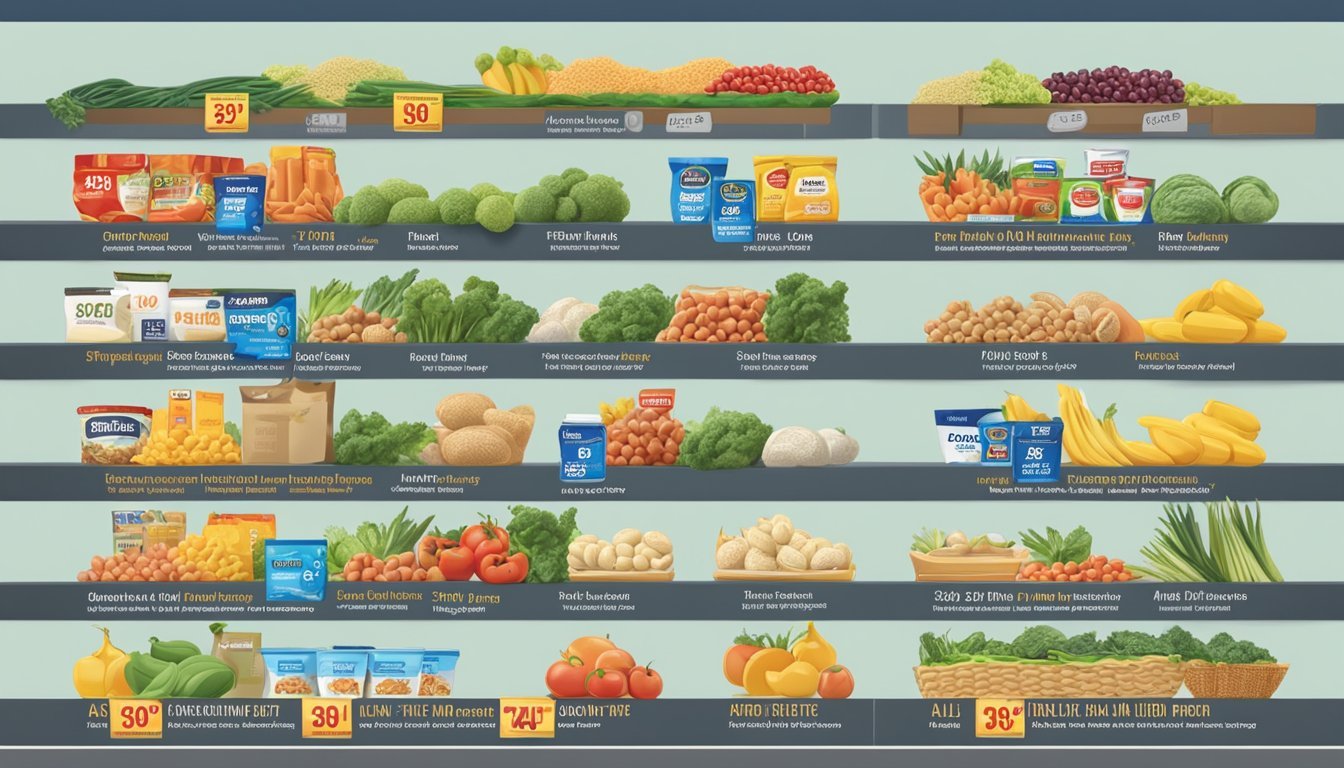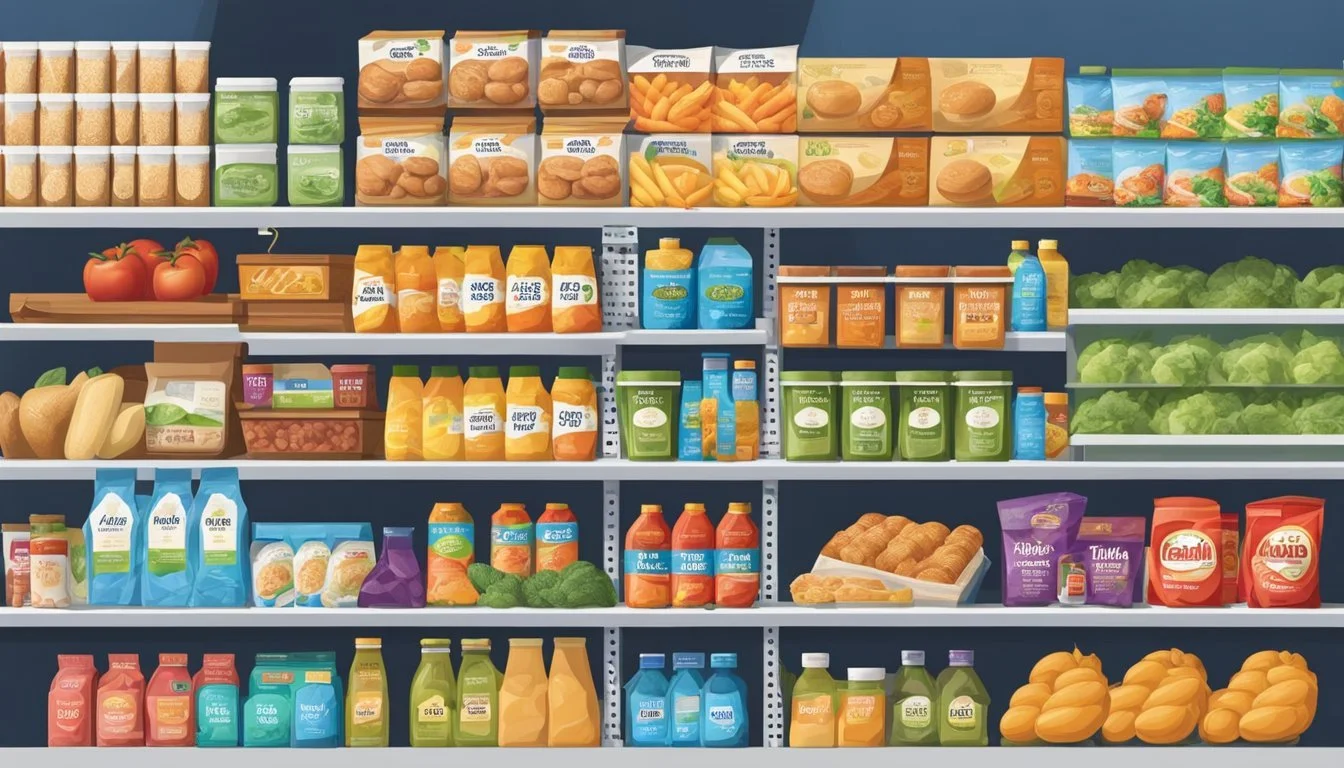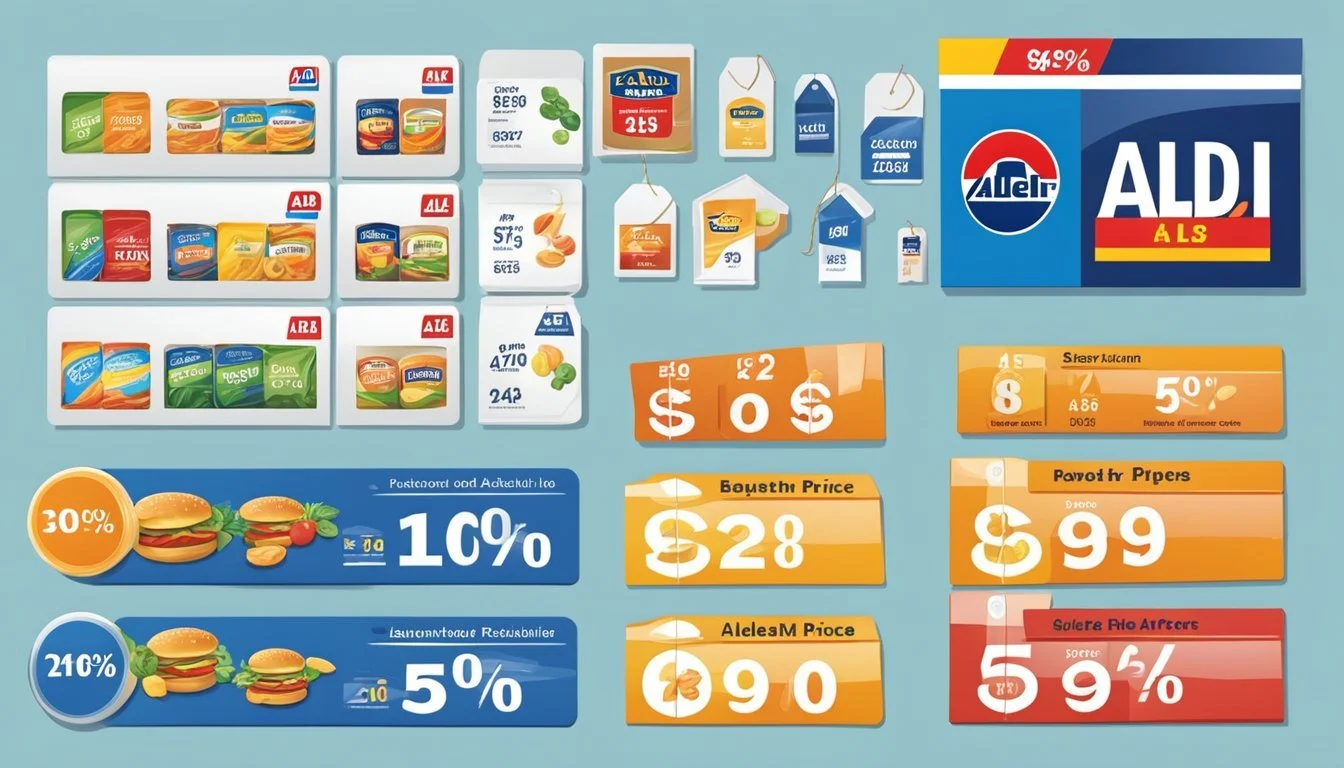Is Aldi Cheaper Than Meijer?
Comparing Grocery Prices and Value
Part of Our Grocery Store Guide with Details on Aldi Prices and Meijer Prices
When it comes to grocery shopping, cost is a major deciding factor for many consumers. With a plethora of options available, Aldi and Meijer are two retail giants often compared for their prices. Aldi, a German discount supermarket chain, has made a name for itself by offering a range of private label items, which generally allows them to keep prices low. Their business model focuses on simplicity and cost-saving strategies, such as a smaller store footprint and a no-frills shopping experience.
On the other hand, Meijer, an American supercenter chain, provides a more traditional shopping environment with a wide variety of brand-name products alongside their own private labels. Recent comparisons suggest that while Aldi has historically been known for its lower prices, Meijer has shown competitiveness in pricing, even coming out cheaper in some comparisons. It's important to note, however, that while Aldi might offer lower prices in many categories, its smaller selection could mean that consumers might not find everything they need, potentially leading to shopping at multiple stores.
Price comparisons can be intricate, as they often depend on the specific items, the location, and the time of the comparison. Hence, shoppers may find that one store is cheaper for certain products or during specific promotions. Therefore, individuals seeking to minimize their grocery bills are encouraged to consider their own shopping lists and compare prices regularly, as the more affordable option can vary depending on these factors.
Price Comparison Overview
When comparing Aldi and Meijer for grocery shopping, consumers are often curious about which store offers the lowest prices and the best value for their money. Each store has its pricing strategy, and the choice can affect a shopper's total savings.
Understanding Grocery Pricing Models
Both Aldi and Meijer have distinct approaches to grocery pricing. Aldi's model is built around a selection of primarily private label goods, which allows it to offer products at lower prices. They achieve cost savings by streamlined operations and limited product selection, which translates into lower prices for shoppers. Meijer, on the other hand, provides a wide range of name brand and private label products, and it often features sales and promotions that can lead to substantial savings.
Evaluating Overall Cost-effectiveness
When evaluating the overall cost-effectiveness between Aldi and Meijer, one must look at the total expense incurred from shopping at each store. Based on the collected data:
Meijer's total for a specific basket of items was reported to be $98.44.
Aldi's total for the same basket of items was $102.22.
This indicates that Meijer can be approximately 4% cheaper than Aldi based on a direct comparison of specific items. However, Aldi is known for its low prices due to its cost-saving measures. It’s crucial for shoppers to consider their usual grocery lists and shopping habits when determining which store could result in greater savings.
Product Selection and Brands
When comparing Aldi and Meijer, shoppers will notice differences in product selection and brand offerings, specifically regarding store brand, national brand availability, and organic options.
Comparing Store Brand Offerings
Aldi's selection is predominantly composed of its private labels, focusing heavily on in-house brands such as Baker's Corner and its organic line. Meijer also offers a variety of store brands, including their more recognizable Meijer branded products. Both store brands allow these retailers to offer products at more competitive prices than name-brand equivalents.
National Brands Vs. Private Labels
While Meijer carries a broad array of national brands alongside its private labels, Aldi's shelves are stocked primarily with its own brands. This strategic decision supports Aldi’s ability to maintain lower prices. Shoppers loyal to name-brand products may find a wider selection at Meijer, whereas Aldi's customers are often encouraged to try the store's private labels.
Organic and Specialty Options
Both Aldi and Meijer offer organic and specialty products, but their approaches differ. Aldi provides these options under its store brand, such as the Simply Nature line of organic products. In contrast, Meijer's Simple Truth brand is their go-to line for organic and specialty items, occasionally priced lower than similar national brands. Their selections cater to an increasing demand for healthier and environmentally conscious choices.
Cost Analysis by Grocery Category
When comparing the grocery prices of Aldi and Meijer, one needs to consider each category to discern which retailer provides the better value. This analysis dissects costs across various departments: produce, meat and deli, dairy and eggs, and pantry staples and dry goods.
Produce Department Comparison
Aldi often prices its produce more competitively, banking on volume and private-label goods. Consumers can usually find lower prices here for fruits and vegetables.
Meat and Deli Varieties
The meat sector typically shows close price points between Aldi and Meijer. However, Aldi may have fewer brand options, focusing instead on offering lower-cost alternatives.
Dairy and Eggs Pricing
When shopping for dairy and eggs, Aldi repeatedly emerges with lower pricing. Essential items such as milk, butter, and cheese are often found at more affordable rates at Aldi.
Milk: Consumers see savings at Aldi compared to Meijer.
Eggs: Similarly priced, Aldi gives better value depending on the current promotions.
Cheese: Economic but limited variety at Aldi contrasted with a broader range at Meijer, potentially at a higher cost.
Pantry Staples and Dry Goods
Pantry essentials such as bread, pasta, rice, and flour typically present greater savings at Aldi. Meijer may offer a wider selection, but Aldi's pricing for these staples is often hard to beat.
Bread: Consistently lower prices are found at Aldi.
Pasta/Rice: Aldi comes out ahead with its lower-priced alternatives.
Flour: Competitive pricing at Aldi for both white and whole wheat varieties.
Consumer Shopping Experience
When comparing Aldi and Meijer, one must consider how the store layout and checkout procedures contribute to the overall shopping experience.
Store Layout and Navigation
At Aldi, customers can expect a straightforward, no-frills layout that emphasizes quick shopping trips. The store design is such that shoppers follow a single, designated path that leads them through the store, which can speed up the shopping process. Aldi primarily stocks store brands, and with fewer product varieties, it simplifies the decision-making process for consumers.
In contrast, Meijer offers a more traditional supermarket layout, giving shoppers the flexibility to navigate through wide aisles and various departments at their own pace. This allows more room for browsing a diverse range of products, including national brands and Meijer’s store brands, catering to a broader consumer base.
Checkout Procedures and Efficiency
Aldi utilizes a fast and efficient checkout system. Carts are acquired through a coin deposit system, which helps keep cart costs low and ensures that carts are returned to their designated spots. At the checkout, the speed is facilitated by barcodes on multiple sides of the products, allowing cashiers to scan items quickly. However, shoppers must bag their own purchases, which some may find inconvenient.
Meijer has various checkout options including self-checkout lanes for faster service and staffed lanes for a more traditional checkout experience. Customers using the staffed checkout lanes can expect a more personal interaction and assistance with bagging. Meijer's approach to checkout tends to be more varied, aiming to cater to the preferences of a wider range of customers.
Discounts and Savings Opportunities
When shopping for groceries, consumers often seek the best deals through discounts and savings opportunities. Both Aldi and Meijer offer various ways to save money, including regular sales events and exclusive loyalty programs.
Sales and Promotional Events
Aldi is known for its weekly sales, particularly the Aldi Finds which feature discounts on select items ranging from food to home goods. These sales present opportunities to buy products at significantly lower prices than the regular cost. Meanwhile, Meijer frequently hosts sales events and promotional offers across various departments. They provide temporary markdowns that lead to immediate savings at checkout.
Loyalty Programs and Coupons
Meijer reinforces their savings strategy with the mPerks loyalty program. This program allows shoppers to earn rewards on their purchases, receive personalized discounts, and access digital coupons that can be redeemed for additional savings. Aldi, on the other hand, does not operate a store-specific loyalty program but encourages shoppers to save by offering consistently low prices on their private-label items. Customers also have the chance to save money by using manufacturer coupons when available, making it possible to secure the lowest prices on certain products.
Comparative Analysis of Grocery Chains
In evaluating the affordability and market strategies of Aldi and Meijer, it becomes essential to consider how these chains position themselves in the competitive landscape of U.S. grocery retailers, which includes giants like Walmart, Kroger, and Trader Joe's.
Market Position of Aldi Vs. Meijer
Aldi and Meijer are distinct in their market positioning. Aldi operates on a low-cost model, offering predominantly private label items. It optimizes efficiency to keep prices low, targeting cost-conscious customers. This approach has allowed Aldi to expand significantly, reflected in the chain's plan to increase its store count in America.
In contrast, Meijer is a regional powerhouse in the Midwest, with a wider selection of both national brands and private labels. Meijer combines the offerings of a supermarket with other goods, positioning itself as a one-stop shop akin to Walmart or Target. While Meijer often provides a larger selection, a recent price comparison indicated that Meijer can sometimes be slightly cheaper than Aldi, though this may depend on the types of items purchased and local pricing strategies.
Competition With Other Retailers
Aldi and Meijer face steep competition from large national chains such as Walmart, Kroger, and Amazon. Walmart is known for competitive pricing and is a benchmark for value in the grocery industry, frequently offering the best overall value for a wide range of products.
Kroger, being one of the largest supermarket chains in the U.S., competes by offering a diverse array of products including its own private labels, organic options, and online shopping services. Similarly, Trader Joe's focuses on offering unique and gourmet items, often under its own branding, and maintains a strong cult following for its high-quality and affordably priced products.
Another contending model is that of Publix, which emphasizes customer service and a pleasant shopping experience, while still maintaining competitive pricing and a range of private-label items. Target has also become a notable competitor with its expanded grocery sections and the added convenience of shopping for a diverse array of products beyond food.
Lastly, Amazon has entered the brick-and-mortar grocery space with Amazon Fresh, coupling in-store shopping with the benefits of its online retail dominance. This heightens the competition for both Aldi and Meijer, as consumers are increasingly looking toward convenience and integration with online shopping options.
Each grocery chain, including Aldi and Meijer, has unique strategies to remain competitive, and their diverse approaches reflect the complexity and dynamic nature of the American grocery retail landscape.
Factors Affecting Pricing Strategies
In the competitive grocery market, retailers like Aldi and Meijer tailor their pricing strategies intricately, with location and supply logistics playing pivotal roles.
Location and Demographics
Aldi and Meijer understand that where a store is located significantly impacts its pricing. A store in an area with higher living costs might have higher prices due to increased operational expenses. Demographics are also critical; stores must appeal to the local population's spending habits. If a store such as Aldi is situated in a region with a high concentration of budget-conscious families, its pricing strategy will likely be geared towards offering lower-cost items to attract those customers.
Location factors:
Region-specific living costs
Proximity to competitors
Accessibility for consumers
Demographic factors:
Average income levels
Consumer preferences
Family size distribution
Supply Chain and Suppliers
The nature of the relationship between a grocery store and its suppliers also dictates pricing. Aldi's strategy often involves long-term relationships with suppliers to keep costs low, ensuring savings for the consumer. This engages the suppliers in a large volume, low-margin arrangement that optimizes the supply chain cost-effectiveness. Meijer might employ a similar approach but could also be stocking a wider variety of premium items, which can affect pricing due to the diverse range of suppliers and the logistical complexities of a more extensive inventory.
Supply Chain factors:
Efficiency of logistics and distribution
Inventory management practices
Sourcing strategies
Supplier factors:
Negotiation of purchase prices
Terms of contracts with suppliers
Diversification of supplier base
Practical Advice for Consumers
When it comes to grocery shopping, consumers often debate between stores to stretch their budget further. Understanding which store offers lower prices and how to shop strategically can result in significant savings on grocery bills. This section delivers targeted advice for those looking to maximize their grocery dollar and adopt frugal shopping practices.
Maximizing Grocery Budget
Consumers aiming to reduce their grocery expenditure should consider Aldi as a strong contender for the cheapest grocery store offering. Aldi’s focus on private labels aids in keeping prices low, allowing families to save on their overall grocery bills. To ensure a well-rounded meal plan, shoppers may need to supplement with purchases from other stores for items not carried by Aldi. Regularly reviewing Aldi's weekly deals, known as Aldi Finds, can provide additional savings on a range of products.
Meal Plan Strategy: Plan meals around Aldi's discounted items and special buys.
Price Tracking: Keep a record of common items' prices to identify patterns and best buy times.
Strategies for Frugal Shoppers
Frugal shoppers can employ strategies to stretch their grocery budget regardless of the store. Comparing Aldi and Meijer, Meijer's app can be used to find real-time prices on comparable items, ensuring that a shopper never overpays. Additionally, incorporating coupons and taking advantage of Meijer’s loyalty program might close the price gap on certain items.
Coupon Utilization: Use Meijer’s app for digital coupons and personalized deals to apply direct savings.
Loyalty Programs: Sign up for Meijer's mPerks for potential discounts and rewards on purchases.
By focusing on these efforts, shoppers can maintain a healthy and economical grocery list, tailored to their family's needs. Utilizing both Aldi for their low-price staples and Meijer for variety and brand-specific items could provide a balanced approach to achieving greater savings and value.
Conclusion
When evaluating Aldi and Meijer in terms of cost-effectiveness, various factors come into play. Aldi tends to have a reputation for low-cost items, primarily due to its focus on private label goods and its cost-saving measures. The store's strategy of minimalistic design and efficiency in operations allows for competitive pricing, which can be particularly attractive for shoppers looking to stretch their grocery budget.
Meijer, on the other hand, offers a wider variety of brands, including national names, which might appeal to those who prioritize selection over pricing. The store's dry goods section, based on one comparison, shows Meijer being slightly cheaper than Aldi, indicating that the store can offer savings to consumers in certain categories.
Product Variety:
Aldi: Limited, mostly private label
Meijer: Extensive, includes national brands
Average Cost Savings:
Aldi: Generally lower prices with a focus on essentials
Meijer: Competitive in specific categories, with occasional price advantages
It's also important to consider the shopping experience. Aldi's streamlined approach is designed for quick trips, while Meijer may cater to shoppers who prefer a one-stop shop for groceries and other goods. Both stores have their own set of advantages that could influence a consumer's decision based on their shopping priorities.
Therefore, the choice between Aldi and Meijer may hinge on the shopper’s preferences for cost savings, selection, and shopping experience. Shoppers are encouraged to compare prices based on their regular shopping lists to determine which store offers the best value on the items they purchase most frequently.









